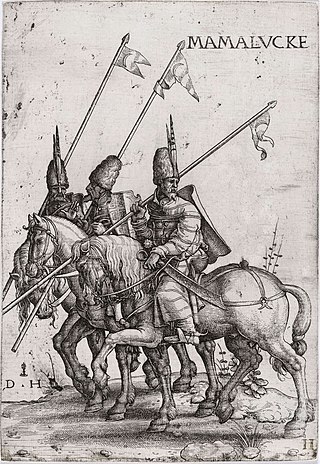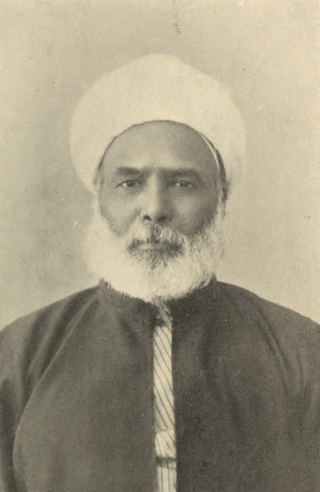Related Research Articles

Alexandria is the second largest city in Egypt and the largest city on the Mediterranean coast. It lies at the western edge of the Nile River delta. Founded in c. 331 BC by Alexander the Great, Alexandria grew rapidly and became a major centre of Hellenic civilisation, eventually replacing Memphis, in present-day Greater Cairo, as Egypt's capital. Called the "Bride of the Mediterranean" internationally, Alexandria is a popular tourist destination and an important industrial centre due to its natural gas and oil pipelines from Suez.

Cairo is the capital and largest city of Egypt and the Cairo Governorate, being home to more than 10 million people. It is also part of the largest urban agglomeration in Africa, the Arab world and the Middle East. The Greater Cairo metropolitan area is the 12th-largest in the world by population with over 22.1 million people.

The Society of the Muslim Brothers, better known as the Muslim Brotherhood is a transnational Sunni Islamist organization founded in Egypt by Islamic scholar and schoolteacher Hassan al-Banna in 1928. Al-Banna's teachings spread far beyond Egypt, influencing today various Islamist movements from charitable organizations to political parties.

Salah ad-Din Yusuf ibn Ayyub, commonly known as Saladin, was the founder of the Ayyubid dynasty. Hailing from a Kurdish family, he was the first sultan of both Egypt and Syria. An important figure of the Third Crusade, he spearheaded the Muslim military effort against the Crusader states in the Levant. At the height of his power, the Ayyubid realm spanned Egypt, Syria, Upper Mesopotamia, the Hejaz, Yemen, and Nubia.

Muhammad Anwar es-Sadat was an Egyptian politician and military officer who served as the third president of Egypt, from 15 October 1970 until his assassination by fundamentalist army officers on 6 October 1981. Sadat was a senior member of the Free Officers who overthrew King Farouk I in the Egyptian Revolution of 1952, and a close confidant of President Gamal Abdel Nasser, under whom he served as vice president twice and whom he succeeded as president in 1970. In 1978, Sadat and Menachem Begin, Prime Minister of Israel, signed a peace treaty in cooperation with United States President Jimmy Carter, for which they were recognized with the Nobel Peace Prize.

Gamal Abdel Nasser Hussein was an Egyptian military officer and politician who served as the second president of Egypt from 1954 until his death in 1970. Nasser led the Egyptian revolution of 1952 and introduced far-reaching land reforms the following year. Following a 1954 attempt on his life by a Muslim Brotherhood member, he cracked down on the organization, put President Mohamed Naguib under house arrest and assumed executive office. He was formally elected president in June 1956.

The Fatimid Caliphate, also known as the Fatimid Empire, was a caliphate extant from the tenth to the twelfth centuries CE under the rule of the Fatimids, an Isma'ili Shia dynasty. Spanning a large area of North Africa and West Asia, it ranged from the western Mediterranean in the west to the Red Sea in the east. The Fatimids trace their ancestry to the Islamic prophet Muhammad's daughter Fatima and her husband Ali, the first Shia imam. The Fatimids were acknowledged as the rightful imams by different Isma'ili communities as well as by denominations in many other Muslim lands and adjacent regions. Originating during the Abbasid Caliphate, the Fatimids initially conquered Ifriqiya. They extended their rule across the Mediterranean coast and ultimately made Egypt the center of the caliphate. At its height, the caliphate included—in addition to Egypt—varying areas of the Maghreb, Sicily, the Levant, and the Hejaz.

Mamluk or Mamaluk were non-Arab, ethnically diverse enslaved mercenaries, slave-soldiers, and freed slaves who were assigned high-ranking military and administrative duties, serving the ruling Arab and Ottoman dynasties in the Muslim world.

The Ayyubid dynasty, also known as the Ayyubid Sultanate, was the founding dynasty of the medieval Sultanate of Egypt established by Saladin in 1171, following his abolition of the Fatimid Caliphate of Egypt. A Sunni Muslim of Kurdish origin, Saladin had originally served the Zengid ruler Nur ad-Din, leading Nur ad-Din's army in battle against the Crusaders in Fatimid Egypt, where he was made Vizier. Following Nur ad-Din's death, Saladin was proclaimed as the first Sultan of Egypt by the Abbasid Caliphate, and rapidly expanded the new sultanate beyond the frontiers of Egypt to encompass most of the Levant, in addition to Hijaz, Yemen, northern Nubia, Tarabulus, Cyrenaica, southern Anatolia, and northern Iraq, the homeland of his Kurdish family. By virtue of his sultanate including Hijaz, the location of the Islamic holy cities of Mecca and Medina, he was the first ruler to be hailed as the Custodian of the Two Holy Mosques, a title that would be held by all subsequent sultans of Egypt until the Ottoman conquest of 1517. Saladin's military campaigns in the first decade of his rule, aimed at uniting the various Arab and Muslim states in the region against the Crusaders, set the general borders and sphere of influence of the sultanate of Egypt for the almost three and a half centuries of its existence. Most of the Crusader states, including the Kingdom of Jerusalem, fell to Saladin after his victory at the Battle of Hattin in 1187. However, the Crusaders reconquered the coast of Palestine in the 1190s.

The Al-Azhar University is a public university in Cairo, Egypt. Associated with Al-Azhar Al-Sharif in Islamic Cairo, it is Egypt's oldest degree-granting university and is known as one of the most prestigious universities for Islamic learning. In addition to higher education, Al-Azhar oversees a national network of schools with approximately two million students. As of 1996, over 4,000 teaching institutes in Egypt were affiliated with the university.

Ayman Mohammed Rabie al-Zawahiri was an Egyptian-born pan-Islamist militant and physician who served as the second general emir of al-Qaeda from June 2011 until his death in July 2022. He is best known for being one of the main orchestrators of the September 11 attacks.

Mansoura is a city in Egypt located on the eastern bank of the Damietta branch of the Nile river. The city is the capital of the Dakahlia Governorate and has a population of 621,953 as of 2021.

Al-Jamāʻah al-islāmīyah is an Egyptian Sunni Islamist movement, and is considered a terrorist organization by the United Kingdom and the European Union, but was removed from the United States list of Foreign Terrorist Organizations in May 2022. The group was dedicated to the overthrow of the Egyptian government and replacing it with an Islamic state. Following the coup that toppled Mohamed Morsi, the group has committed to peaceful activities.

Cairo University is Egypt's premier public university. Its main campus is in Giza, immediately across the Nile from Cairo. It was founded on 21 December 1908; after being housed in various parts of Cairo, its faculties, beginning with the Faculty of Arts, were established on its current main campus in Giza in October 1929.

Muḥammad ʿAbduh was an Egyptian Islamic scholar, judge, and Grand Mufti of Egypt. He was a central figure of the Arab Nahḍa and Islamic Modernism in the late 19th and early 20th centuries.

The Egyptian revolution of 1952, also known as the 1952 coup d'état and 23 July Revolution, was a period of profound political, economic, and societal change in Egypt. On 23 July 1952 the revolution began with the toppling of King Farouk in a coup d'état by the Free Officers Movement. This group of army officers was led by Mohamed Naguib and Gamal Abdel Nasser. The Revolution ushered in a wave of revolutionary politics in the Arab World, and contributed to the escalation of decolonisation, and the development of Third World solidarity during the Cold War.

Oxyrhynchus, also known by its modern name Al-Bahnasa, is a city in Middle Egypt located about 160 km south-southwest of Cairo in Minya Governorate. It is also an important archaeological site. Since the late 19th century, the area around Oxyrhynchus has been excavated almost continually, yielding an enormous collection of papyrus texts dating from the Ptolemaic Kingdom and Roman Egypt. They also include a few vellum manuscripts, and more recent Arabic manuscripts on paper.

Egypt, officially the Arab Republic of Egypt, is a transcontinental country spanning the northeast corner of Africa and the Sinai Peninsula in the southwest corner of Asia. It is bordered by the Mediterranean Sea to the north, the Gaza Strip of Palestine and Israel to the northeast, the Red Sea to the east, Sudan to the south, and Libya to the west. The Gulf of Aqaba in the northeast separates Egypt from Jordan and Saudi Arabia. Cairo is the capital and largest city of Egypt, while Alexandria, the second-largest city, is an important industrial and tourist hub at the Mediterranean coast. At approximately 110 million inhabitants, Egypt is the 14th-most populated country in the world, and the third-most populated in Africa.

The Battle of Marj Dābiq, a decisive military engagement in Middle Eastern history, was fought on 24 August 1516, near the town of Dabiq, 44 km north of Aleppo. The battle was part of the 1516–17 war between the Ottoman Empire and the Mamluk Sultanate, which ended in an Ottoman victory and conquest of much of the Middle East and brought about the destruction of the Mamluk Sultanate. The Ottoman victory in the battle gave Selim's armies control of the entire region of Syria and opened the door to the conquest of Egypt.

The Mamluk Sultanate, also known as MamlukEgypt or the Mamluk Empire, was a state that ruled Egypt, the Levant and the Hejaz from the mid-13th to early 16th centuries. It was ruled by a military caste of mamluks headed by a sultan. The sultanate was established with the overthrow of the Ayyubid dynasty in Egypt in 1250 and was conquered by the Ottoman Empire in 1517. Mamluk history is generally divided into the Turkic or Bahri period (1250–1382) and the Circassian or Burji period (1382–1517), called after the predominant ethnicity or corps of the ruling Mamluks during these respective eras.
References
- ↑ Muhammad 'Abduh and Al-Waqa', m.sc thesis, Ahmad Husayn al-sawi, 1954, McGill University
- ↑ Colonialism and revolution in the Middle East, Juan Cole, Princeton University Press, 1992, page 297